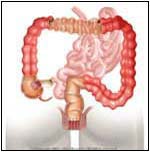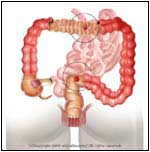|
|
 |

Normal |

Abnormal |
|
|
-
Polyps are
small masses that protrude in the colon. These may be benign
or cancerous. Some of the benign lesion types (hyperplastic
polyps) always stay benign, while other types (adenomas) can
turn into cancer. Discovering adenomas is important because
it is believed that eventually they will turn into cancer --
the larger the adenomas, the higher the likelihood. In
addition, there are rare family (genetic) syndromes in which
multiple polyps occur in the colon. Some of these syndromes
have a very high risk of developing
cancer.
|
 |
- Usually no symptoms
- Blood in bowel
movements
|
 |
- Hemoccult testing (stool at home
placed on special cards to check for microscopic blood)
- Flexible Sigmoidoscopy (scope
placed in rectum to look at lower part of colon only)
- Barium Enema (barium given in rectal enema allowing X-Rays of the colon to be
taken)
- Colonoscopy (scope
passed through rectum to look at entire colon) -- studies
show this is the best test to detect colon
polyps.
|
 |
- Polyp removal during Colonoscopy for
smaller polyps
- Surgical polyp removal for larger
polyps
|
 |
-
Familial
(genetic) syndromes associated with multiple colon
polyps
- Familial adenomatous polyposis, Gardner's Syndrome,
and Turcot's syndrome -- are genetically transmitted conditions in which hundreds of polyps form. Nearly everyone with these genetic conditions develops Colon Cancer by age
50; therefore, surgical removal of the colon is advised by
age 35, or as determined by the doctor.
- Peutz-Jeghers Syndrome -- a genetically transmitted
syndrome of benign tumors of the colon called hamartomas.
These do no turn into cancer, but 50% of people with this
condition develop cancer in places other than the colon,
specifically the breasts, genitals, pancreas, stomach, or
duodenum. The reason they develop these other cancers is
unknown. Those with this condition also have thick-looking
freckle lesions on the lips, mouth, and skin.
- Familial juvenile polyposis -- also a genetic syndrome characterized by benign tumors (also hamartomas). There is an increased risk or Colon Cancer with this condition.
|
| | |
If you want your friend to read or know about this article, Click here
 |
|
|

